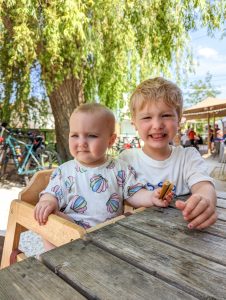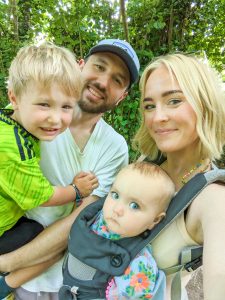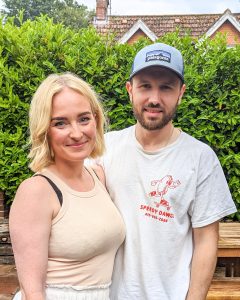Abi Richards was just 27 years old when she was given the devastating news that she had cancer.
Scans had revealed 13 tumours in her liver and two on her lung. If the diagnosis wasn’t bad enough, Abi was told she had just two weeks to live.
With time running out, our doctors recommended trying cancer immunotherapy, making it clear that although the treatment might work, there was a risk it could also speed up the progression of the disease.
Abi Richards, Immunotherapy patientWhen we were told I had cancer, I immediately thought about all the things that we would never do and having a family was one of them.
Abi didn’t hesitate and was immediately put on a combination of immunotherapy drugs ipilimumab and nivolumab, both of which at the time, had only recently been licensed and made available on the NHS.
Miraculously, within six months the tumours had shrunk, and no active cancer cells were detected. It was one of the most remarkable cases Southampton doctors had seen and demonstrated the amazing power of immunotherapy.
Seven years on, Abi is thriving and enjoying life as a mum-of-two, something which she thought she and Ross would never get to experience.

“I remember it so well,” she said. “When we were told I had cancer, I immediately thought about all the things that we would never do and having a family was one of them. Cancer was not in the plan, having children was in the plan, but that all stopped when I was diagnosed.
“And even when I got better, we still didn’t know if it would be possible to get pregnant because they told me the treatment may affect my fertility. At the time, I knew I just had to have the treatment to give myself a chance of getting better but we felt so much sadness to think we’d never have children. We are so lucky to be here and have our family together.”
Teddy, four, was born two years after Abi was given the amazing results that the immunotherapy had worked, and just last year, Abi and Ross, welcomed baby Emmie who is now one.

Abi still looks back with disbelief at the experience she had. After being diagnosed, she received the immunotherapy treatment every three weeks and expected to have some side effects, but those that she did experience were manageable and short lived. After the second course of treatment, a scan revealed the immunotherapy had started to work and her tumours had reduced in size. Just a few months later, a detailed PET scan showed there was no longer any ‘evidence of disease’ in her body.
Both Abi and Ross are incredibly grateful for the treatment she received and the work it took to get those treatments to the clinic. Abi still attends scans every six months to ensure she remains cancer-free.
“It is a bit strange to look back and think about what we went through – it will never leave me. Sometimes going to the hospital can be a bit hard, but I am incredibly grateful to the doctors, nurses, and researchers. Without clinical trials and all the work that happened – sometimes taking years and years – I would not be here; I am sure of it. I think all the scientists are amazing – the work they do is so important, and it offers some comfort that if anything went wrong again, there could a trial that might help me.
Abi Richards,Without clinical trials and all the work that happened – sometimes taking years and years – I would not be here; I am sure of it
“The people who support medical research are also vitally important to the research process – without donors the work and places like the Centre for Cancer Immunology would not happen. The donors, the clinical teams and the scientists have all saved my life. I cannot thank them enough, but not just on my behalf but for all the people who have been on a clinical trial or received immunotherapy, their dedication is to our benefit.”
